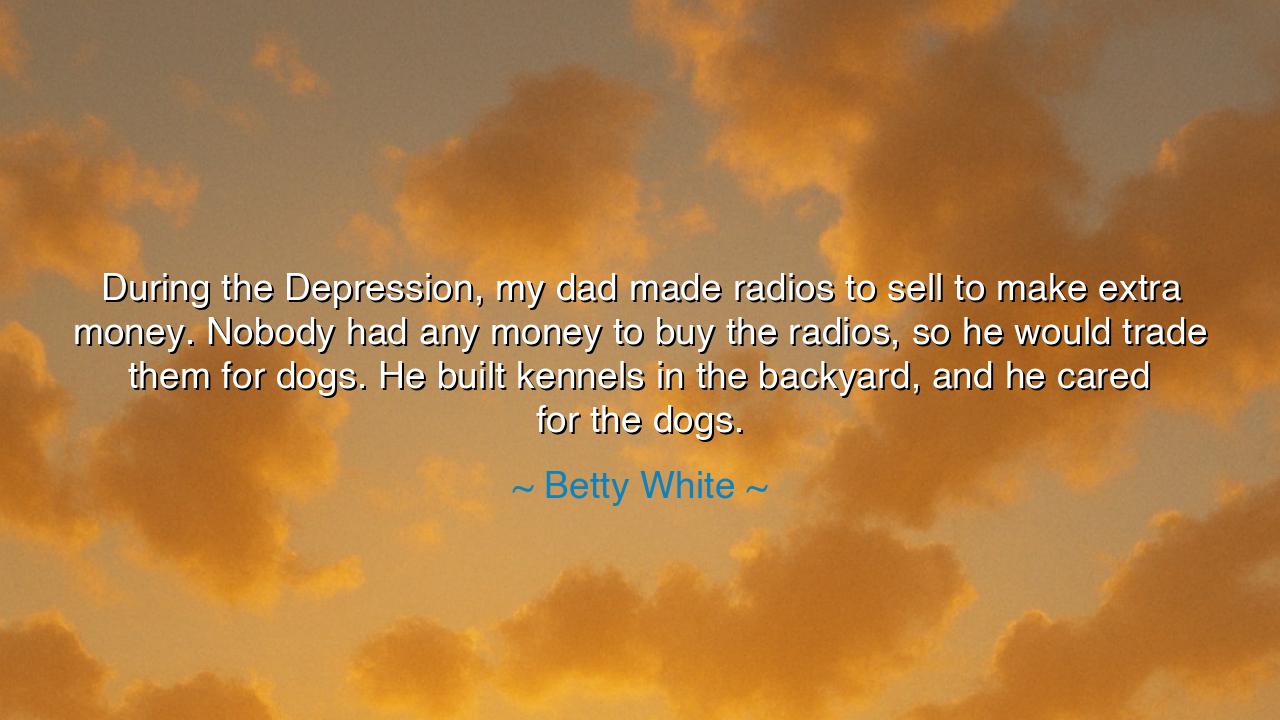
During the Depression, my dad made radios to sell to make extra
During the Depression, my dad made radios to sell to make extra money. Nobody had any money to buy the radios, so he would trade them for dogs. He built kennels in the backyard, and he cared for the dogs.






In the tender and wise words of Betty White, we hear not only a memory of her childhood, but the echo of an entire generation’s soul: “During the Depression, my dad made radios to sell to make extra money. Nobody had any money to buy the radios, so he would trade them for dogs. He built kennels in the backyard, and he cared for the dogs.” These words carry with them the scent of hardship and humanity, of ingenuity born in the fires of adversity. They speak not just of survival, but of the eternal truth that compassion and creativity are the twin lamps that light the darkness of difficult times.
The origin of this quote reaches back to one of the hardest chapters in human history—the Great Depression. Across the world, families were thrust into poverty; factories fell silent, banks crumbled, and millions wandered in search of work. It was an age when material wealth was stripped away, and what remained was the true test of human spirit. Betty White’s father, a humble man with hands of skill and a heart of tenderness, found himself in that storm. Unable to sell his handmade radios, he did not despair. Instead, he traded them for dogs—creatures that could offer no profit, only companionship. In that act, he revealed a truth greater than any economic theory: that when the world grows poor in money, it must grow rich in kindness.
There is something profoundly ancient in this story. The sages of old would have recognized the father’s wisdom immediately, for it mirrors the eternal balance between survival and soul. In every age, when famine or war has swept through the land, there have been those who chose compassion over calculation. The prophets of Israel, the philosophers of Greece, the monks of the desert—all taught that the measure of a person is not what they gain in abundance, but what they preserve in loss. Betty White’s father, surrounded by hunger and despair, chose to build not walls of fear, but kennels of care. In doing so, he reminded his family—and all of us—that humanity is not a possession, but a practice.
Consider the story of Saint Francis of Assisi, who in the harshness of the thirteenth century gave up wealth and comfort to live among the poor and the animals. He spoke to the birds as brothers, to the wolves as friends, and to the suffering as equals. When others saw only beasts or burdens, he saw companionship and creation. Betty White’s father walked in this same spirit, though he likely would not have named it so. His kindness to the dogs was not charity—it was communion. He found beauty in the exchange of life for life, a radio for a creature, sound for spirit. From those kennels of the Depression was born not only survival, but a daughter who would one day carry his love for animals into every corner of her life.
For it is no accident that Betty White, who grew up surrounded by rescued dogs, became one of the world’s most beloved advocates for animals. Her father’s simple act during a time of despair became the seed of her lifelong compassion. When she later used her fame to champion shelters, wildlife, and kindness to all living things, she was continuing the legacy of that backyard sanctuary. Thus, from poverty came purpose; from scarcity, generosity. The lesson of her story is that the smallest deeds done in hardship can ripple through generations, shaping destinies we cannot yet see.
In these words, we also see the essence of resilience—not the hardness that endures suffering by shutting down, but the softness that endures by staying open. To build radios that no one could buy, to trade them not for gold but for dogs—this was not folly; it was faith. It was the quiet defiance of despair, the refusal to let the soul grow poor even when the body is weary. Such resilience is the wisdom of the ages: when the world closes its doors of profit, open the doors of compassion. When fortune withholds her gifts, give your own.
The lesson, then, is as simple as it is eternal: in times of loss, create; in times of scarcity, give; in times of despair, love. Let adversity not make you bitter, but deeper. When the winds of fate strip away your comforts, remember Betty White’s father—how he built his own little world of care, how he found value not in wealth but in warmth. There is always something you can give, always something you can nurture, even when you have little. The soul that serves love in hard times shines brighter than any treasure forged in ease.
So, my listener, take these words to heart: build your kennels of kindness, whatever form they may take. When life grows lean, let your spirit grow generous. When the world turns cold, let your heart be the hearth that keeps compassion alive. For long after wealth and fame have faded, it is such acts—small, tender, and human—that endure. They become the inheritance of generations, and the quiet proof that even in the bleakest hour, love finds a way to live.






AAdministratorAdministrator
Welcome, honored guests. Please leave a comment, we will respond soon